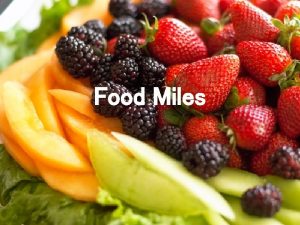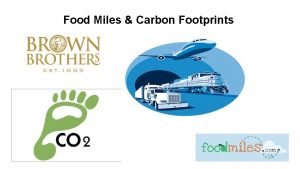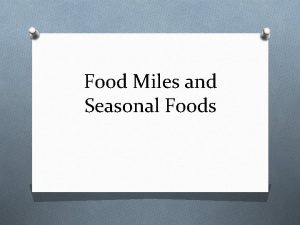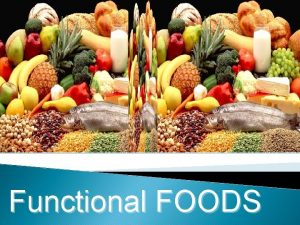Food miles Food miles Where do foods that










- Slides: 10

Food miles

Food miles Where do foods that we eat in the UK come from? Saudi Arabia Tomatoes 3, 100 miles California Oranges 5, 000 miles West Indies Bananas 4, 000 miles Argentina Beef and pears 6, 900 miles Central Africa Cocoa beans 3, 000 miles New Zealand Lamb 11, 700 miles 2

Food miles What are food miles? Food miles is the phrase used to describe a way of calculating how far food has travelled to get to the consumer. It encompasses other terms such as ‘from farm to fork’ or ‘field to plate’, and makes us think about where the food we eat really comes from. Food miles not only include the distance that food travels to reach the UK, but also transportation to the factory, from the factory to the shop, from the shop to our homes and even removing the waste foods away from homes and to landfill. Food can travel to the UK by plane, boat or road and all of these methods can cause pollution, so measuring food miles allows us to consider the environmental impact of our food choices and their effects on the environment. 3

Food miles What are food miles? • Food miles are sometimes shown as a carbon emission label on packaging. • Fossil fuel, used in transporting food around the world, contributes to global warming. • Greenhouse gas emissions include carbon dioxide emissions, as well as emissions of methane, nitrous oxide and industrial gases such as hydrofluorocarbons. 4

Food miles Food and examples of their origin • • • Apples – South Africa Bananas – Caribbean Brazil nuts – Brazil Cashew nuts – India Chocolate – Ivory Coast Coffee – Columbia Mangoes – Australia Oranges – Spain Wine – New Zealand 5

Food miles Bigger picture If we choose to buy products that are grown and produced in the UK, it is possible to reduce the amount of unnecessary food miles. Using food miles does not always produce the best results in reducing your carbon footprint. 6

Food miles Bigger picture By importing food we generate large amounts of CO 2 causing global warming. The countries that are most affected by CO 2 causing global warming are those we import from. For example, some African countries will not be able to farm any more due to drought. Nowadays, young people want to stay in farming because there is money in it. They can have smartphones and fashionable clothes by living here, not in a city. Our villages have been transformed by the food we produce. Better education can be provided to our children by using the money from producing our crops. We can also improve our standard of living. 7

Food miles Bigger picture Riding your bicycle to the supermarket rather than driving a car will help to lower emissions and slow down global warming. If we don’t get enough rain to water our crops, or if we can’t sell our crops around the world, we won’t be able to have a decent life. 8

Food miles Bigger picture Too big a carbon footprint will contribute to global warming! Our farming contributes little to global warming. We use people to weed fields, not a tractor. I wonder whether stopping the export of our produce would stop the planes flying and whether that would really reduce the carbon emissions? The direct social, environmental, and economic costs of food transport are estimated at over £ 9 billion each year. 9

Food miles Bigger picture • In sub-Saharan Africa, 1 to 1. 5 million people’s livelihoods depend on the UK-based food chain. • The UK spends £ 1 million per day on fruit and vegetables that were grown in sub-Saharan Africa. • On average, one Kenyan is responsible for 0. 3 tonnes of CO 2, while the average Briton is responsible for over five times that amount. • Food production and consumption contributes 18% of total greenhouse gas emissions in the UK. • The energy used for importing Kenyan green beans is 12 times that as for using UK beans. 10
 Con hãy đưa tay khi thấy người vấp ngã
Con hãy đưa tay khi thấy người vấp ngã Thơ thất ngôn tứ tuyệt đường luật
Thơ thất ngôn tứ tuyệt đường luật Tôn thất thuyết là ai
Tôn thất thuyết là ai Phân độ lown
Phân độ lown Chiến lược kinh doanh quốc tế của walmart
Chiến lược kinh doanh quốc tế của walmart Gây tê cơ vuông thắt lưng
Gây tê cơ vuông thắt lưng Block nhĩ thất độ 2 mobitz 2
Block nhĩ thất độ 2 mobitz 2 Tìm vết của đường thẳng
Tìm vết của đường thẳng Sau thất bại ở hồ điển triệt
Sau thất bại ở hồ điển triệt Thơ thất ngôn tứ tuyệt đường luật
Thơ thất ngôn tứ tuyệt đường luật Food miles examples
Food miles examples


















